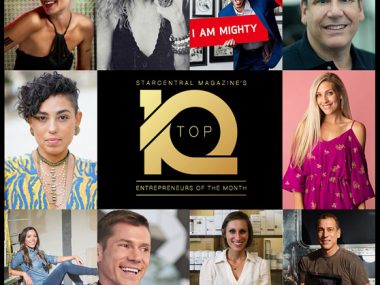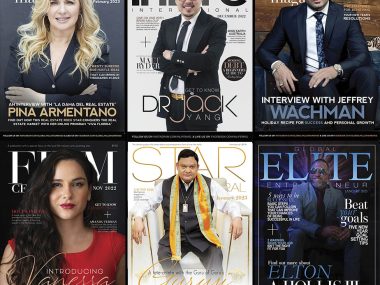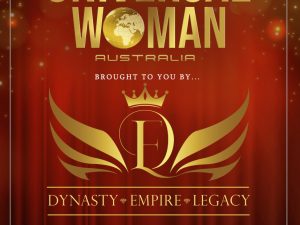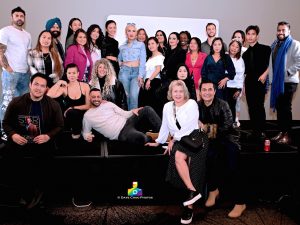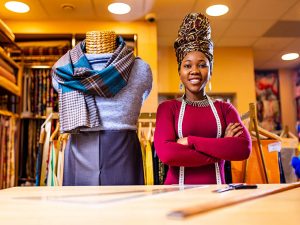Janine Manning is the co-founder of Rebecca Page which is a company that creates a range of beginner-friendly, easy-to-sew, inclusive size range sewing patterns and sew along with unrivaled fitting expertise. They have over 370,000 engaged and creative members in their global community. The company is also a female co-founded UK business, that began trading in April 2018. They have 20 all-female employees and contractors who are based in over 10 countries and they all work remotely. They also buck the trend in that over half of their investors are female. Digitally disrupting a traditional industry means that they are scaling and growing quickly, even during the COVID-19 crisis.
From a personal perspective, Janine sold a business to a Fortune-500 business in 1998, when her 4 children were still young. About 7 years ago she became an angel investor, and two years ago she’s one of the co-founders of Rebecca Page.
StarCentral Magazine recently caught up with Janine Manning to discuss her journey to entrepreneurship and here’s what went down:
Could you please tell our readers a brief background about yourself and how you started your business?
After university, I qualified as an accountant and quickly discovered that I enjoyed ‘rolling my sleeves up’ and working in fast-growing, early-stage ventures. To build and broaden my skills, I completed an MBA 10 years later, and more recently an MSt in Social Innovation from The University of Cambridge. I mentor a group each year for the New Zealand Women’s Network in London, and in 2018 Rebecca Page was a mentee in my start-up group. She was exploring whether she could turn her sewing hobby into a business, and at the end of the 12-week program, we co-founded Rebecca Page Ltd.
Can you describe your journey to success? When did you start? Did you ever imagine you would become this successful?
I left New Zealand for the ‘Kiwi OE’ in London the day after my final university exam in 1988 and started working for a large US computer company. After a year I went to work for a smaller company, who was a client of the large company. The business had a ton of potential but lacked financial and strategic direction. I purchased 40% of the company and scaled it with my business partner for the next nine years. We were acquired by a Fortune 500 company in 1998, which meant that after the handover period, my husband and I returned to New Zealand in 1999 to bring up our four young children.
What is your main source of income?
Rebecca Page Ltd is digitally disrupting the traditional home-sewing market by building an online B2C business that sells sewing patterns, products, and services to an underserved community with highly specific demographics. 45% of our revenue comes from the US, 15% from the UK, 10% from Australia, and 30% from the rest of the world.
What are you currently doing to maintain/grow your business?
We are developing new online verticals such as Sewing Summits, sewalongs, and courses. Our subscription offering is also very popular with our community of 370,000+ followers.
What social media platforms do you usually use to increase your brand’s awareness?
Mostly Facebook and Instagram.
What is your experience with paid advertising, like PPC or sponsored content campaigns? Does it work?
As a fast-growing, early-stage company, we have chosen to work with the agile, specialist marketing company ‘The Runway Media.’ This has been cost-effective and efficient in improving our marketing ROI.
What is your main tactic when it comes to making more people aware of your brand and engaging your customers? How did your business stand out?
We have a large, active, and highly engaged Facebook community. Our customers share the garments they have created in an inclusive and positive environment. Rebecca is the ‘face’ of Rebecca Page and shares sewing videos and posts, which creates brand awareness.
What form of marketing has worked well for your business throughout the years?
We have only been in business for two years, during which time a combination of e-mail marketing to our database and Facebook (organic and ads) has worked well with our target demographic of women aged between 35 and 55 years. In saying that, our fastest-growing demographic is women in their twenties, and these followers respond well to Instagram. We regularly offer our customers a ‘freebie’ pattern, which has been a great way to build our community.
How did your brand stand out from the rest of the other brands out there that is similar to your niche?
Home sewing with an online, digital focus is a niche, predominantly ‘cottage’ industry. We stand out because of our ability to build an inclusive and engaged global community.
What is the toughest decision you had to make in the last few months?
We decided to buck the trend and increase our marketing spend after the onset of COVID-19 and the lockdown. This has elevated our reach and sales.
What money mistakes have you made along the way that others can learn from (or something you’d do differently)?
As an accountant, I hope that I haven’t made too many money mistakes! The most critical thing to get right is the people that you employ – they can make or break a business. I’m not keen on paying retainers or recruitment fees. I’ve noticed that a common response to COVID-19 has been to look carefully at costs and to slash spending wherever possible. Of course, focussing on revenue growth is essential, but it’s equally as important to always keep a close eye on costs.
What have you learned in the process of becoming wealthy that others can learn from?
Enjoy the journey without the expectation of an outcome.
What new business would you love to start?
I’m not thinking about a new business at the moment. I’d like to keep mentoring younger entrepreneurs and encourage more potential investors (especially women) to support startups and early-stage companies. We are proud that over half of our investors are women and that we have an all-women board of four.
If you could go back in a time machine to the time when you were just getting started, what would you do differently?
From the beginning, Rebecca and I have closely followed the ‘Lean Startup’ methodology. This has meant that we test on a small scale before we fully launch a new initiative. This has worked well for us. It’s also positive to ‘do-it-yourself’ before passing a task over to someone else to do.
If you could go back in a time machine to the time when you were first making a name for yourself, what advice would you give yourself?
Consciously decide to become a life-long learner.
Do you have any favourite business-related or personal development related books that you can recommend to other entrepreneurs?
The Lean Startup by Eric Ries
The Founder’s Mentality: How to Overcome the Predictable Crises of Growth, by Chris Zook & James Allen
The Monk and the Riddle, by Randy Komisar
Straight Talk for Startups, by Randy Komisar and Jantoon Reigersman
What is the best advice you have ever been given?
My first boss, when I was a student, advised me to treat my university day like a workday and also to clear my in-tray each Friday morning. This helped me to develop productive work habits from an early age. More than 30 years later, I still follow his advice, and he still does my tax return.
What advice would you give to a newbie Entrepreneur setting up their first business?
Be careful about who you choose to work with and who you take investment from. Actively engage with your founding investors. From the start, cross the t’s’, dot the I’s, and keep an open mind and an agile mentality. Prepare a Shareholders Agreement, understand it, and then file it away. If you ever need to get it out, there could be trouble ahead.





